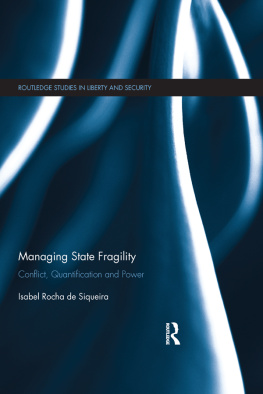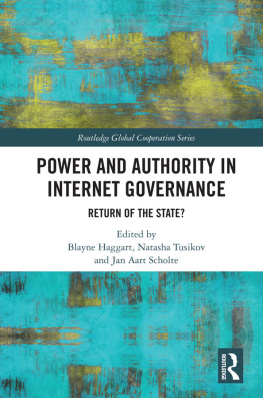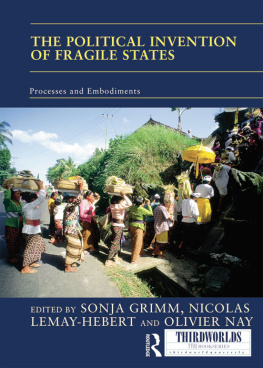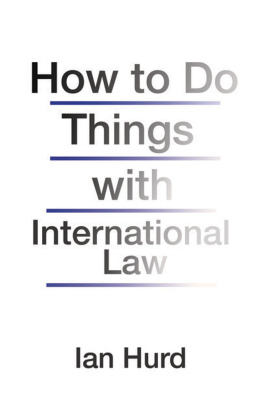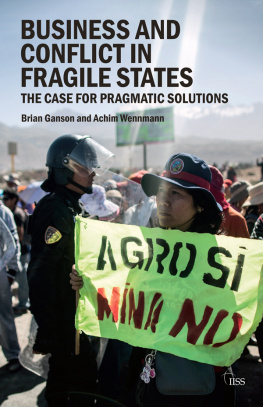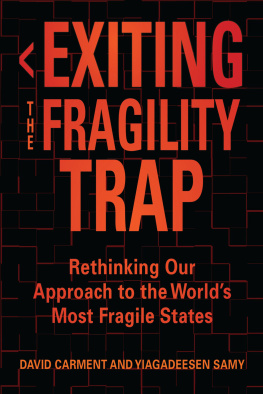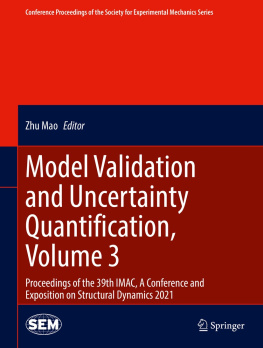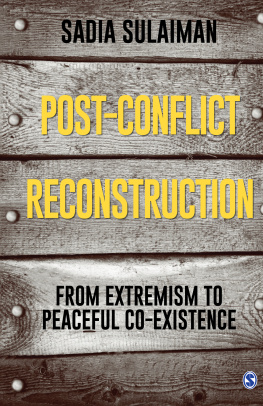Managing State Fragility
This book examines the management of state fragility and the practices and impacts of quantification over relations of power in international politics.
With the further movement towards quantification, and as technical and technological changes advance, this book argues that certain important quantifying practices can be understood in terms of symbolic power, which is more nuanced and subtle. The aim is that such an understanding can also open space for considering other instances of power that are blurred and nuanced in current international politics. By looking at how the merging of conflict and development issues in the fragile states agenda has been fed by and has fed the authority of ever-perfectible numbers, the book offers an approach to address the difficulty in dealing with profound inequality without presuming domination. Instead, the example of the g7+ group of self-labelled fragile states and its tools indicate that quantification has reached a point of no return, but it has done so through indirect practices of management and with the complicity of those deemed least favoured by it. This shows that there is little chance that policy-makers and academics can escape dealing with numbers and there is much to be gained by understanding how complex and knowingly imperfect statistics become authoritative and widespread.
This book will be of much interest to students of critical security studies, International Political Sociology, development studies, and IR in general.
Isabel Rocha de Siqueira is a Lecturer at the Institute of International Relations, Pontifcia Universidade Catlica do Rio de Janeiro (PUC-Rio), Brazil, and holds a PhD in International Relations from Kings College London, UK.
Routledge Studies in Liberty and Security
Series editors: Didier Bigo, Elspeth Guild and R.B.J. Walker
This book series will establish connections between critical security studies and International Relations, surveillance studies, criminology, law and human rights, political sociology and political theory. To analyse the boundaries of the concepts of liberty and security, the practices which are enacted in their name (often the same practices) will be at the heart of the series. These investigations address contemporary questions informed by history, political theory and a sense of what constitutes the contemporary international order.
Terror, Insecurity and Liberty
Illiberal Practices of Liberal Regimes after 9/11
Edited by Didier Bigo and Anastassia Tsoukala
Exceptionalism and the Politics of Counter-Terrorism
Liberty, Security and the War on Terror
Andrew W. Neal
Muslims in the West after 9/11
Religion, Politics and Law
Edited by Jocelyne Cesari
Mapping Transatlantic Security Relations
The EU, Canada and the War on Terror
Edited by Mark Salter
Conflict, Security and the Reshaping of Society
The Civilisation of War
Edited by Alessandro Dal Lago and Salvatore Palidda
Security, Law and Borders
At the Limits of Liberties
Tugba Basaran
Justice and Security in the 21st Century
Risks, Rights and the Rule of Law
Synnve Ugelvik and Barbara Hudson
Transnational Power Elites
The New Professionals of Governance, Law and Security
Edited by Niilo Kauppi and Mikael Rask Madsen
Security and Defensive Democracy in Israel
A Critical Approach to Political Discourse
Sharon Weinblum
Managing State Fragility
Conflict, Quantification and Power
Isabel Rocha de Siqueira
First published 2017
by Routledge
2 Park Square, Milton Park, Abingdon, Oxon OX14 4RN
and by Routledge
711 Third Avenue, New York, NY 10017
Routledge is an imprint of the Taylor & Francis Group, an informa business
2017 Isabel Rocha de Siqueira
The right of Isabel Rocha de Siqueira to be identified as author of this work has been asserted by her in accordance with sections 77 and 78 of the Copyright, Designs and Patents Act 1988.
All rights reserved. No part of this book may be reprinted or reproduced or utilised in any form or by any electronic, mechanical, or other means, now known or hereafter invented, including photocopying and recording, or in any information storage or retrieval system, without permission in writing from the publishers.
Trademark notice: Product or corporate names may be trademarks or registered trademarks, and are used only for identification and explanation without intent to infringe.
British Library Cataloguing in Publication Data
A catalogue record for this book is available from the British Library
Library of Congress Cataloging in Publication Data
Names: Rocha de Siqueira, Isabel, author.
Title: Managing state fragility : conflict, quantification, and power / Isabel Rocha de Siqueira.
Description: Abingdon, Oxon ; New York, NY : Routledge, 2017. | Series: Routledge studies in liberty and security | Includes bibliographical references and index.
Identifiers: LCCN 2016045355| ISBN 9781138682283 (hardback) | ISBN 9781315536613 (ebook)
Subjects: LCSH: Political stabilityDeveloping countries. | Quantitative research. | International relationsResearchMethodology. | Developing countriesForeign relations.
Classification: LCC JF60 .R6 2017 | DDC 320.9172/4dc23
LC record available at https://lccn.loc.gov/2016045355
ISBN: 978-1-138-68228-3 (hbk)
ISBN: 978-1-315-53661-3 (ebk)
Typeset in Times New Roman
by Wearset Ltd, Boldon, Tyne and Wear
This book is based on research conducted between 2010 and 2014 and the resultant PhD thesis presented at the Department of War Studies, Kings College London (KCL), UK. It is also the result of a much welcome PhD scholarship offered by CAPES, Brazil. Two articles have been published based on parts of this research and the various comments on them were taken into account for this book. The text has been extensively updated and it includes the most recent events in the fragile states agenda, such as the inclusion of goal 16 among the new Sustainable Development Goals (SDGs). Goal 16, on peace, justice and strong institutions, reinforces many of the arguments in the book: quantification gains authority from the kind of imperfection very much present in development-and-conflict correlations and vice versa. The fragile states agenda and the aid industry are constantly changing and this books seeks to offer a dynamic text that can do justice to the pace of these transformations. Nevertheless, as it is often all too tempting to find new objects in politics, the book also strives to ground the discussion on fragility on the important events surrounding the broad development-and-conflict correlation in the past two to three decades and in the old debates around statistics in social sciences. The result, it is hoped, is a detailed, grounded and open analysis on the role of numbers and power in international politics, with a reminder that, as the manifestations of power change, so should our accounts of them.
I was lucky enough to have the support of a great network of friends and colleagues who helped me in many ways as I conducted the research that led to this book. I would like to begin by thanking my PhD supervisor, Professor Didier Bigo (KCL, Science Po Paris), for the incalculable support he provided, for his patience in guiding me through ever more challenging questions, and for his encouragement as many other challenges came my way. I am most thankful for the environment offered to researchers at the Department of War Studies, KCL, and for the many courses and events I was able to attend. The department certainly provided the tools I needed not only to conduct a good research but to feel well and welcome. I am also indebted to all those who offered valuable feedback on different parts of this text, at KCL and in diverse meetings and conferences: Vivienne Jabri, Brooke Rogers, Anna Leander, Iver Neumann, Julien Jeandesboz, Mdric Martin-Maz, Paulo Esteves, Joo Nogueira, Jef Huysmans, Monique Jo-Beerli, Olivier Nay, Sonja Grimm, Nicolas Lemay-Hebert, Anna Kraemer, Bruno Magalhes, Chris Leite, Emma McCluskey and the anonymous reviewers of the previous articles and the present book.

